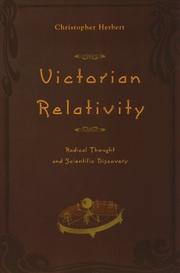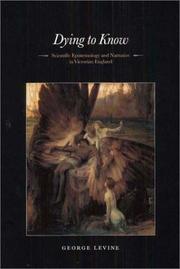| Listing 1 - 4 of 4 |
Sort by
|

ISBN: 1282901931 9786612901935 0226327361 9780226327365 0226327337 9780226327334 0226327329 9780226327327 0226327329 9780226327327 0226327337 9780226327334 Year: 2001 Publisher: Chicago : University of Chicago Press,
Abstract | Keywords | Export | Availability | Bookmark
 Loading...
Loading...Choose an application
- Reference Manager
- EndNote
- RefWorks (Direct export to RefWorks)
One of the articles of faith of twentieth-century intellectual history is that the theory of relativity in physics sprang in its essentials from the unaided genius of Albert Einstein; another is that scientific relativity is unconnected to ethical, cultural, or epistemological relativisms. Victorian Relativity challenges these assumptions, unearthing a forgotten tradition of avant-garde speculation that took as its guiding principle "the negation of the absolute" and set itself under the militant banner of "relativity." Christopher Herbert shows that the idea of relativity produced revolutionary changes in one field after another in the nineteenth century. Surveying a long line of thinkers including Herbert Spencer, Charles Darwin, Alexander Bain, W. K. Clifford, W. S. Jevons, Karl Pearson, James Frazer, and Einstein himself, Victorian Relativity argues that the early relativity movement was bound closely to motives of political and cultural reform and, in particular, to radical critiques of the ideology of authoritarianism. Recuperating relativity from those who treat it as synonymous with nihilism, Herbert portrays it as the basis of some of our crucial intellectual and ethical traditions.
Relativity --- Knowledge, Theory of --- History --- relativity, relativism, victorian, science, religion, faith, truth, authority, objectivity, negation, absolutes, reform, authoritarianism, einstein, james frazer, karl pearson, ws jevons, wk clifford, alexander bain, charles darwin, herbert spencer, knowledge, ideology, logic, proliferation, difference, unity, social change, nonfiction, philosophy, politics, history.
Book
ISBN: 0691186073 Year: 2020 Publisher: Princeton, New Jersey ; Oxford : Princeton University Press,
Abstract | Keywords | Export | Availability | Bookmark
 Loading...
Loading...Choose an application
- Reference Manager
- EndNote
- RefWorks (Direct export to RefWorks)
"Thought experiments have long been a vital part of the creative, intellectual process in modern science-and, by extension, so have "demons." Demons are hypothetical beings imagined by scientists to perform specific roles within thought experiments-embodying special powers or abilities and personifying tough intellectual challenges or highlighting apparent paradoxes. They are used as a way of exploring what would happen if one fiddled with or upset the sturdiest of physical laws, or experimented with physical or natural processes or phenomena in ways that the scientist imagining them otherwise could not. As such, they help clarify the limits of what is possible in the physical world, or show weaknesses in our understanding of an observable phenomenon, or highlight cracks in a hypothesis or theory. Unencumbered by the physicality of our concrete world, demons are thus useful to scientists in their intellectual quest to understand how nature works, and in the creative exploration of the frontiers of science"--
Creative ability in science --- History. --- AI. --- Alan Turing. --- Brownian motion. --- Bruno Latour. --- Cartesian. --- Erwin Schrödinger. --- French Revolution. --- Johann von Neumann. --- Karl Pearson. --- Laplace’s demon. --- Marie Curie. --- Marvin Minsky. --- Max Born. --- Max Planck. --- Maxwell’s demon. --- Michel Serres. --- Norbert Wiener. --- Oliver G. Selfridge. --- Paul Samuelson. --- Pierre Bourdieu. --- Richard Feynman. --- Werner Heisenberg. --- atomic bomb. --- cybernetics. --- daemon. --- demonology. --- ethics of technology. --- evolution. --- natural selection. --- pandemonium. --- radioactivity. --- religion and science. --- virtual reality.

ISBN: 1282904604 9786612904608 0226475387 9780226475387 0226475360 9780226475363 0226475379 Year: 2002 Publisher: Chicago University of Chicago Press
Abstract | Keywords | Export | Availability | Bookmark
 Loading...
Loading...Choose an application
- Reference Manager
- EndNote
- RefWorks (Direct export to RefWorks)
"Dying to Know is the work of a distinguished scholar, at the peak of his powers, who is intimately familiar with his materials, and whose knowledge of Victorian fiction and scientific thought is remarkable. This elegant and evocative look at the move toward objectivity first pioneered by Descartes sheds new light on some old and still perplexing problems in modern science." Bernard Lightman, York University, Canada In Dying to Know, eminent critic George Levine makes a landmark contribution to the history and theory of scientific knowledge. This long-awaited book explores the paradoxes of our modern ideal of objectivity, in particular its emphasis on the impersonality and disinterestedness of truth. How, asks Levine, did this idea of selfless knowledge come to be established and moralized in the nineteenth century? Levine shows that for nineteenth-century scientists, novelists, poets, and philosophers, access to the truth depended on conditions of such profound self-abnegation that pursuit of it might be taken as tantamount to the pursuit of death. The Victorians, he argues, were dying to know in the sense that they could imagine achieving pure knowledge only in a condition where the body ceases to make its claims: to achieve enlightenment, virtue, and salvation, one must die. Dying to Know is ultimately a study of this moral ideal of epistemology. But it is also something much more: a spirited defense of the difficult pursuit of objectivity, the ethical significance of sacrifice, and the importance of finding a shareable form of knowledge.
English prose literature --- Literature and science --- Narration (Rhetoric) --- Knowledge, Theory of, in literature. --- Science in literature. --- Science --- Normal science --- Philosophy of science --- History and criticism. --- History --- Philosophy. --- Descartes, René, --- Descartes, Renatus --- Cartesius, Renatus --- Influence. --- Knowledge, Theory of, in literature --- Science in literature --- 820 "18" --- 820 "18" Engelse literatuur--19e eeuw. Periode 1800-1899 --- Engelse literatuur--19e eeuw. Periode 1800-1899 --- History and criticism --- Philosophy --- Descartes, René --- Rhetoric --- Discourse analysis, Narrative --- Narratees (Rhetoric) --- science, knowledge, research, experimentation, victorian, history, philosophy, objectivity, truth, disinterest, bias, perspective, positionality, self-abnegation, purity, enlightenment, death, sacrifice, descartes, rhetoric, carlyle, autobiography, epistemology, francis galton, machine, ar wallace, women, gender, our mutual friend, dickens, eliot, literature, daniel deronda, hardy, karl pearson, pater, art, altruism, nonfiction.
Book
ISBN: 9783515130431 Year: 2021 Publisher: Stuttgart Franz Steiner Verlag
Abstract | Keywords | Export | Availability | Bookmark
 Loading...
Loading...Choose an application
- Reference Manager
- EndNote
- RefWorks (Direct export to RefWorks)
Deutschland --- (Produktform)Electronic book text --- 1900 --- Abtreibung --- Alfred Ploetz --- Arbeiterbewegung --- Armut --- August Bebel --- August Forel --- August Weismann --- Bevölkerungspolitik --- Biologismus --- biologistisch --- Biowissenschaft --- Charles Darwin --- Clara Zetkin --- Degeneration --- Demografie --- Deutschland --- Eheverbot --- England --- eugenics --- Eugenics Society --- Eugenik --- Eugenikkritik --- Euthanasie --- Evolutionstheorie --- Fabian Society --- feministisch --- Frauenbewegung --- Gebärstreik --- Geburtenrate --- George Bernard Shaw --- Großbritannien --- Hans Fehlinger --- Henriette Fürth --- Herbert Spencer --- ILP --- Independent Labour Party --- Internationaler Eugenischer Kongress --- Karl Kautsky --- Karl Pearson --- Klassenkampf --- Kriminologie --- Kropotkin --- Lamarck --- Lumpenproletariat --- Mendel --- Nation --- Neue Zeit --- neuer Mensch --- Oda Olberg --- Psychiatrie --- race --- Ramsay MacDonald --- Rasse --- Rassehygiene --- Rassenhygiene --- Reform --- Reproduktion --- Revolution --- SDF --- Selektion --- Sidney Herbert --- Social Democratic Federation --- socialism --- Socialist Review --- Sozialdarwinismus --- Sozialdemokratie --- Sozialdemokratische Partei --- Sozialismus --- sozialistisch --- Sozialistische Monatshefte --- SPD --- Sterilisierung, --- Superman --- Übermensch --- Utopie --- Verbrecher --- Vererbung --- Verhütung --- Verhütungsmittel --- Wilhelm Schallmayer --- Wissenschaftlichkeit --- Zwangsinternierung --- (VLB-WN)9550
| Listing 1 - 4 of 4 |
Sort by
|

 Search
Search Feedback
Feedback About
About Help
Help News
News